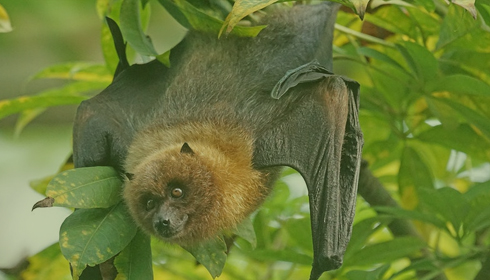
Leave bats alone to prevent future pandemics: Researchers
In a new study published in the journal The Lancet Planetary Health, researchers argue that pandemic prevention requires a worldwide taboo in which humanity agrees to leave bats alone, to allow them to have the habitats they require without interference.
Noting that the COVID19 pandemic, like the SARS coronavirus outbreak in 2003, can be traced back to a bat virus, researchers from Cornell University and the Wildlife Conservation Society in New York stated that the scientific community will likely never know how exactly the virus had transmitted from bat to humans.
Pointing out that even if a virus was accidentally unleashed in a lab, the researchers said that it would have originated from a bat and the global community does not need to know all details to act.
In their paper, the researchers pointed out that bats are known reservoirs for a variety of viral pathogens, including rabies, Marburg, Hendra, Nipah and MERS-CoV (Coronaviridae family).
Moreover, bats of the Pteropodidae family are strongly believed to be a source of viruses of the genus Ebolavirus, they further wrote in their paper.
Read More:
| - WHO launches International Pathogen Surveillance Network to combat infectious disease threats |
Stressing that the role of bats in SARS-CoV and SARS-CoV-2 demands attention, the researchers said that Horseshoe bats are probably the primary source of SARS-type coronaviruses, with such bats in Yunnan, China and Laos so far yielding the closest matches to coronavirus.
“Even if SARS-like viruses might require an intermediate host before eventually getting to humans, that is no less reason to leave bats alone, keep them out of wildlife markets, avoid displacing them, and stop making incursions into their key habitats,” they argued.
Pointing out that every step taken in the direction of prevention can save millions spent on cures, the authors emphasise that humanity must simply take the most basic, common-sense steps to lower the risk of another pandemic, at the point where dangerous viruses can pass from animals to humans.
“In a globalised world with eight billion people, we can no longer ignore our interconnectedness with the wildlife and ecosystems around us. We must change humanity’s relationship with nature if we want to prevent the next pandemic of zoonotic origin—and that can start with bats,” says Dr Susan Lieberman, WCS’s Vice President for International Policy.
Simply put, humans need to fix their broken relationship with nature, particularly with wildlife and bats. The costs of enacting the necessary human behavioural adjustments are negligible compared to the expenses of another worldwide pandemic (which could be considerably more devastating).
“Getting humanity to work collaboratively at a global scale underpins most of the existential challenges we face, from climate change and environmental pollution to biodiversity loss and ecosystem collapse, this at a time when earnest collaboration even at local scales often seems elusive,” says Cornell Professor of Wildlife Health & Health Policy Steven A. Osofsky, lead author of the study.
“However, if we can actually stop hunting, eating, and trading bats, stay out of their caves, keep livestock away from areas where bats are concentrated, and if we can stop deforesting, degrading (or even start restoring) their natural habitats, we can indisputably lower the chances of another pandemic,” he added.
The authors emphasise that allowing bats to survive and thrive will result in billions of dollars in ecosystem services such as mosquito and other harmful pest management and pollination of many critical crops.
They conclude that while humans’ interactions with other animals deserve scrutiny, respecting bats and the habitats they require is truly the lowest-hanging fruit of genuine upstream pandemic prevention.